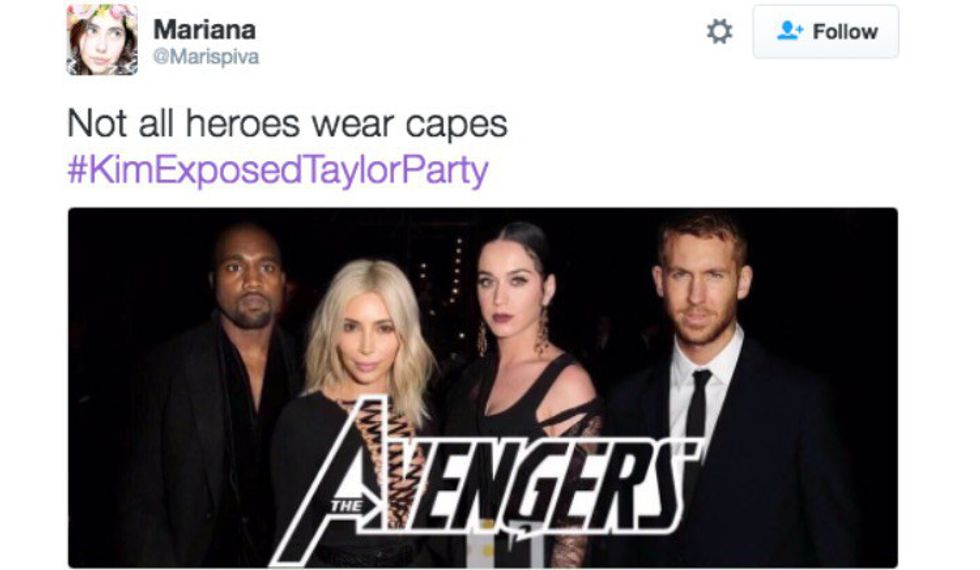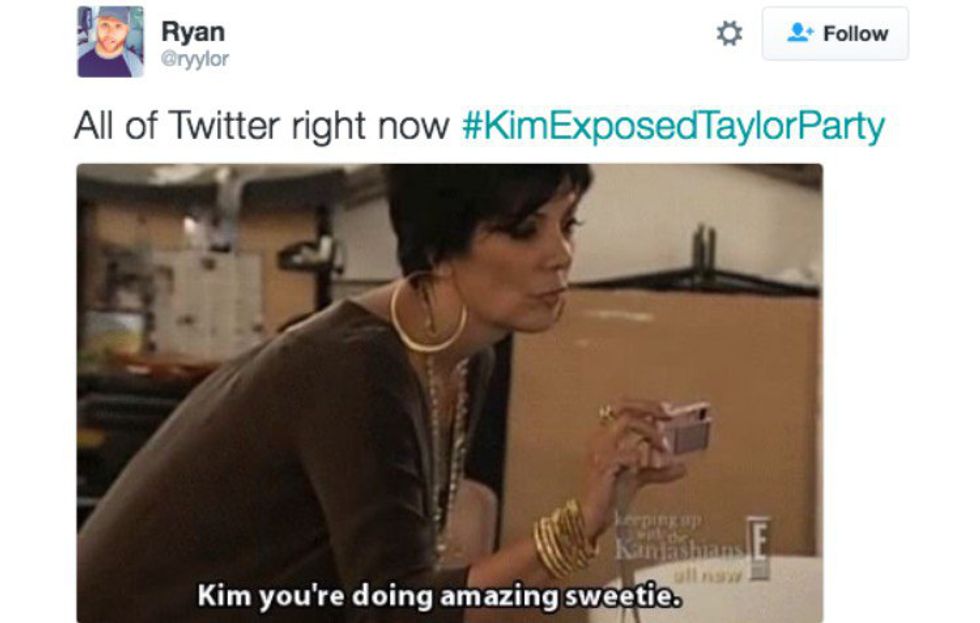Unless you've been completely disconnected from social media, national news outlets, and celebrity gossip columns for the past week, you are probably aware of the controversy surrounding Taylor Swift after a Snapchat story posted by Kim Kardashian Sunday night. The video proved that Taylor manipulated the story behind Kanye West's song "Famous" to protect her own reputation. Before Kim's tell-all Snapchats went viral, the following narrative was widely accepted as truth: Kanye releases "Famous" in February 2016, which contains the lyrics "I think that me and Taylor might still have sex / I made that bitch famous" (referring to his infamous interruption of her acceptance speech at the 2009 Video Music Awards). The misogynistic lyric sparks outrage, to which Kanye responds with a series of tweets claiming that Taylor had approved the song over the phone before its release. Taylor, taking offense to the lyric, claims through an official statement by her publicist that Kanye called to ask her to release the song on her Twitter, but that she had not been made aware of or approved the lyric in question. Fast forward to June 16th, when Kim Kardashian claims in an interview with GQ that Taylor had in fact approved the lyric, and that she has video proof. The drama fizzles out shortly after the article's release, leaving fans to decide for themselves who to believe.
That is until July 17th, when Kim posted said video proof to her Snapchat story, not only confirming that Taylor had heard and supported the "Famous" lyrics (besides Kanye referring to her as "that bitch"), but also rewriting Taylor's entire narrative in which she is merely a victim of Kanye's derogatory songwriting. Unsurprisingly, fans were disappointed that the singer had blatantly lied and kept up her innocent façade for so long. More surprising was the enthused celebration that followed on nearly every form of social media, especially on Twitter under the trending hashtag "#KimExposedTaylorParty".
By the "finally-this-liar-gets-what-she-deserves" attitude expressed in media statements and social media responses to the controversy, one thing is made crystal clear: Most people are not celebrating the fact that Kanye West's reputation is restored, or that Taylor's lie has been uncovered. They are celebrating the "downfall" of a woman who has had tremendous influence over the music industry and careful control over her image for the past decade.
The progression of the world's opinion of Taylor Swift since the beginning of her career is a familiar one, which we have all seen in television and in politics since before feminism became fashionable. Woman in the public eye exhibits behaviors that are seen as either too feminine or too masculine. Woman faces ridicule and backlash by the media and the general population. Woman is reduced to the terms "annoying" or "bitchy," depending on whether the offending behaviors are seen as feminine or masculine. Anne Hathaway has been unable to shake the title of the world's most annoying actress since her Oscar win in 2013, because she came off as too perfect and rehearsed in her acceptance speech, "thanked her husband too hard," looked too surprised about her win, and "[tried] too hard to please everybody" by apologizing publicly for changing her dress at the last minute. On the other end of the spectrum is Hillary Clinton, the female presidential candidate who has received intense criticism for everything from her voice to her clothing to the fact that she “doesn’t smile enough.” These criticisms would be seen as shallow and pointless if applied to a man, yet the media and American voters continue to shame Clinton for her career-driven, assertive attitude that is so widely accepted in male politicians. One New York Times writer claimed that the reason Clinton is so unlikable is that “she just doesn’t seem all that fun.”
Over the course of Taylor Swift’s career, each new boyfriend and corresponding break up song has pushed her further into “annoying girl” territory. The media’s only explanation for the fact that she has dated multiple people and uses her art form to express her relationship woes is that she must be an over-emotional serial dater who can’t stand the thought of being single. Meanwhile, Ed Sheeran, John Mayer, and Justin Bieber have written songs inspired by past relationships, but none have fallen prey to the media’s idea that personal, emotional lyrics equal weakness and pettiness. This is a narrative reserved solely for female songwriters, and one that makes Taylor Swift easy to hate.
At the same time, Taylor garnered a reputation for being “cold-blooded and calculating” after highly publicized efforts to protect her fame and public persona. She sued her old guitar teacher for using the web domain ITaughtTaylorSwift.com. She spoke out against music streaming services like Spotify and Apple Music for not allowing artists to make restrictions on who can stream their music and not properly compensating artists whose music can be streamed for free (which many viewed as a selfish move). And most famously, she debuted her brand new squad, a collection of mostly white, mostly slim women such as model Gigi Hadid and singer Ellie Goulding that featured in many Instagram photos and walked the runway at her concerts. The media quickly wrote off the squad as a way for Taylor to prove her new self-proclaimed identity as a feminist, and as proof that her type of feminism is one-sided and does not take other factors such as race and transgender issues into account. And the media is completely right: Taylor’s lawsuits and controversies are as much (if not more) about presenting herself as a victim to the cruel music industry as they are about Taylor just doing what she wants to do. Although she proudly calls herself a feminist and speaks out against the sexist portrayals of herself in the media, her feminism benefits her much more than it does any marginalized group. However, to hate Taylor Swift for manipulating her public image is to hate a celebrity for doing what is part of any celebrity’s job description: Crafting a persona that will appeal to a target audience, which in Taylor’s case is the current generation of teenage girls who feel they can relate to her heartbreak and who are beginning to explore the concept of feminism. Considering her ten Grammy Awards and 86.1 million Instagram followers, Taylor is not only a talented songwriter but a marketing genius who knows exactly what her target audience wants.
With the Snapchat reveal of her detailed lie, Taylor’s palace of good PR is crumbling down around her for the first time, proving to even her most hardcore fans that she puts a good deal of work into maintaining a spotless reputation and that her role as the well-meaning victim is far from genuine. But this does not justify the collective internet’s gleeful response, nor does it mean that Taylor’s career is dead. The enthusiastic celebration of a powerful female celebrity’s “takedown” says less about Taylor Swift personally, but reveals more about the way society views females who are “too much” of anything —
too calculating, too emotional, too crazy. Even the new trend of idolizing Kim Kardashian now that she has exposed Taylor demonstrates a fault in society’s idea of what makes a female valuable. Many Twitter users have expressed the fact that they now appreciate the reality star and businesswoman, as if her success in building her personal brand (including apps, games, clothing, and beauty lines) does not warrant respect but being involved in the takedown of another woman does. This also proves the cultural relevance of the stereotypical “catty” girls trope that the media loves to play up whenever two famous women disagree on something — it is not enough to acknowledge that Kim revealed Taylor’s lie to defend her husband’s reputation. The conflict must be blown out of proportion and made to seem like an epic catfight between the two women. Both Taylor and Kim have a similar reputation for being fake and calculated, but one is now being valued because she was able to turn public opinion against the other.Everyone involved in the “Famous” feud of 2016 is at fault in some way. Kanye West wrote a sexist lyric and used a derogatory term that degrades women, regardless of who approved it. Kim Kardashian released a possibly illegal recording of a phone call that Taylor may not have been aware was being recorded. Whether or not Taylor had always planned to play the victim when the song was released, she approved the lyrics then feigned surprise and fabricated a story to show her innocence. There is no denying that what Taylor did is wrong, and that she has landed herself in a mess that her and her PR team could be struggling to recover from for a long time. However, before you throw a party celebrating the fact that America’s Sweetheart has fallen from her pedestal, ask yourself if you are excited about the fact that her lie has been uncovered in this specific situation, or that a public personality that you find annoying or bitchy for behaviors that any male celebrity gets away with has finally met what appears to be her end.


























